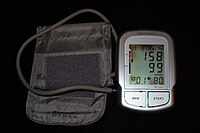
Photo from wikipedia
We aimed to determine the frequency of blood glucose and electrocardiogram (EKG) abnormalities in previously healthy children who present to an emergency department (ED) with a diagnosis of benign syncope.… Click to show full abstract
We aimed to determine the frequency of blood glucose and electrocardiogram (EKG) abnormalities in previously healthy children who present to an emergency department (ED) with a diagnosis of benign syncope. Chart review of consecutive children aged 5 to 18 years presenting to the pediatric ED from 2004 to 2014 with a discharge diagnosis of benign syncope was done. Of 969 patients, hypoglycemia (serum glucose <60 mg/dL) was present in only 3 cases (0.3%). Of 754 patients with EKG performed, only 4 cases (0.6%) was an abnormality requiring further cardiac evaluation identified; cardiac echocardiogram was performed in 3 of these 4 patients, which revealed no cardiac pathology. Financial analysis for performing blood glucose measurement and EKG on these patients amounted to total health care cost of $222 526. We concluded that previously healthy children with syncope rarely have hypoglycemia or underlying cardiac abnormality. The routine performance of tests can incur significant health care expenditure.
Journal Title: Clinical Pediatrics
Year Published: 2019
Link to full text (if available)
Share on Social Media: Sign Up to like & get
recommendations!